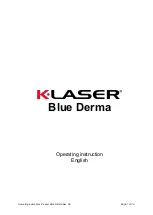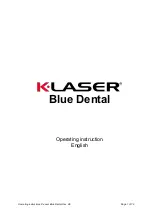
AIRTUG
®
Assembly & Operating Instructions
MODELS: 10-S & 10-H
Airtug, LLC is not responsible for aircraft damage sustained when proper clearance is
not maintained between the tug and the aircraft and the surroundings.
WARNING:
This tug is shipped WITHOUT gas or oil in the engine. Using the 10W-30 Oil provided,
fill to the “Full” mark on the dipstick. Fill the fuel tank with regular unleaded gasoline (non-ethanol).
Engine Operation:
To start the engine, push the throttle all the way forward to the “choke”
position and press the starter button by foot located on the tug frame behind the engine. Once
started, adjust the engine to a low-mid range power setting. For heavier aircraft, increase the power
setting accordingly. The engine is stopped by pulling the throttle all the way back towards the
operator. Use a low amp battery charger (available at Airtug 216-941-9781) to maintain a fully
charged battery between use and especially in colder environments.
Tug Operation:
The twist grip handle operates the hydrostatic transaxle.
Rotating the twist grips
forward or aft moves the Airtug accordingly. Rotating the grip slightly in either direction will move the
tug very slowly. As you increase the rotation of the handle grips, the tug speed increases. Maximum
torque is applied at very slow speeds ensuring excellent maneuverability in the hangar and around
other aircraft while rotating the handle grips fully results in maximum tug speed and minimum torque.
The hydrostatic transaxle provides smooth variable speed control throughout the entire range of grip
motion. The twist grip is spring loaded to “return-to-brake position.” This position locks the power-
train. The tug will not move in this position. Nevertheless, it is not recommended to walk away from
the tug while the engine is running. While moving the aircraft, braking is effected by gradually
returning the grip to the neutral or brake position. Even while moving an aircraft on a downgrade, the
tug will only go as fast as you have the twist grip turned. Braking too abruptly with a heavy aircraft or
moving too fast can seriously damage the differential ring gear. This is considered abuse and is not
covered by the transaxle warranty. When moving an aircraft over the hangar door weather edge or
door rail, it’s recommended to have a little momentum and to smooth out the transition. Hangar
Ramps can be purchased from Airtug.
Aircraft Loading:
Position the Airtug up to the the nose wheel with the ramp centered on the
wheel and stop. Using the strut strap or optional “J” hook (purchased separately), connect the winch
hook and using the winch pull the aircraft onto the tug until the tire hits the backstop or chock
accessory for aircraft with a nose wheel fairing. Make sure the winch is in the locked position prior to
moving the tug. All Airtug load platforms are designed for retractable gear. All Airtug require adapters
to accommodate tail wheelers or nose wheel fairings.
SAVE THIS DOCUMENT AND ENSURE ALL OPERATORS READ IT PRIOR TO MOVING ANY AIRCRAFT
1






















